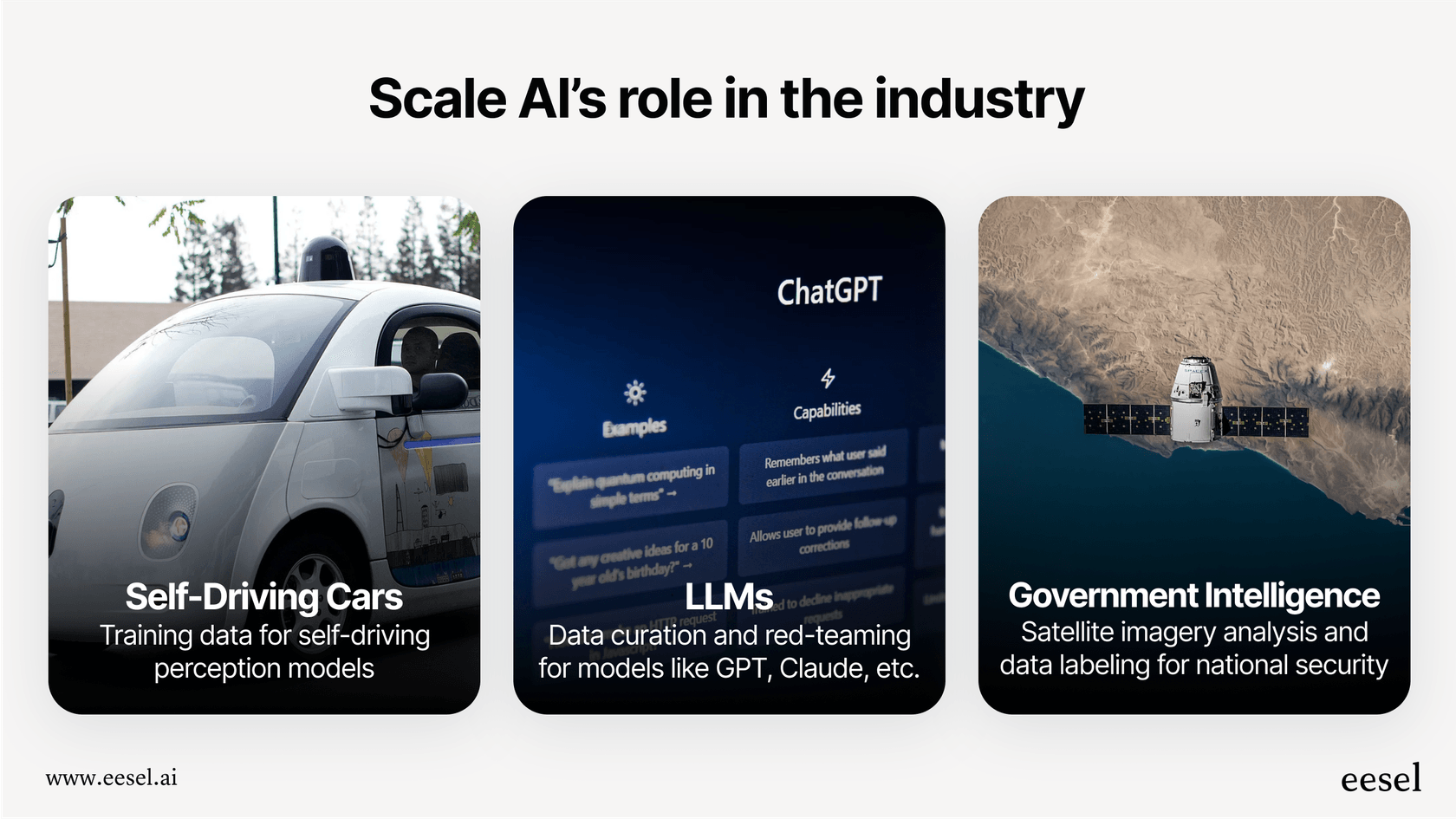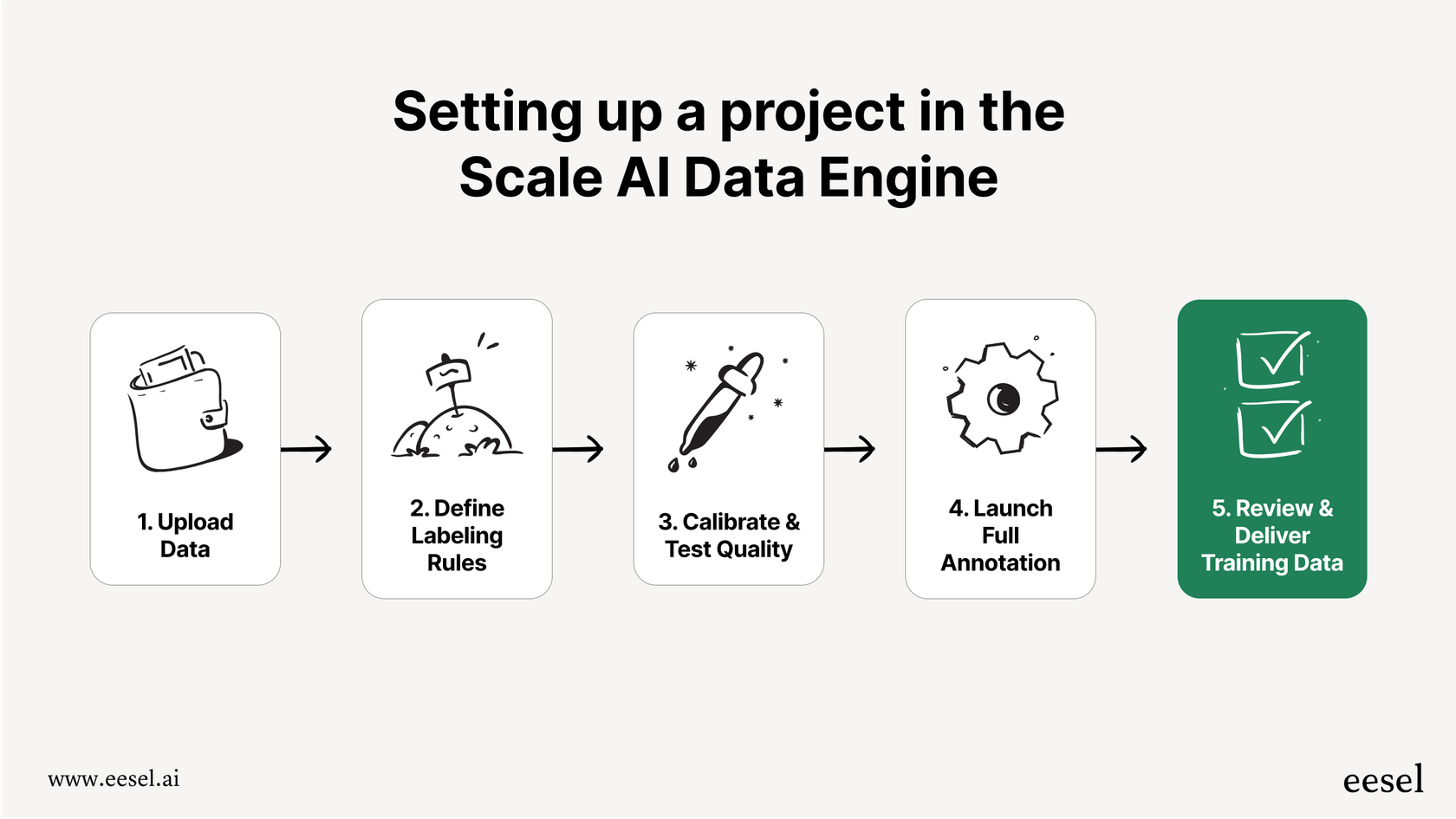
Let's be honest, AI runs on one thing: data. A mind-boggling amount of high-quality, well-organized data. And behind many of the biggest names in AI, from the models writing your emails to the systems in self-driving cars, there's a company building the essential plumbing to make it all work. That company is Scale AI.
You've probably never used Scale AI directly, but it's one of the most important players in the AI world, working quietly in the background. They provide the critical data labeling, curation, and evaluation services that AI models need to learn and get better over time.
In this article, we'll pull back the curtain on what Scale AI is, what it actually does, and who it's really built for. We’ll also compare its heavy-duty, developer-first platform to more specialized, self-serve AI tools designed for business teams who need to solve problems now.

What is Scale AI?
At its heart, Scale AI is on a mission to speed up AI development by providing the data infrastructure everyone needs. It was started back in 2016 by Alexandr Wang, who actually dropped out of MIT at 19. He saw that the biggest roadblock for AI wasn't a lack of clever algorithms, but the incredible difficulty of getting enough clean, labeled data to train them.
The company got its start with data annotation, mostly helping autonomous vehicle companies teach their AI to tell the difference between a pedestrian, a stop sign, and another car using sensor data. Since then, it’s grown into a full-blown AI platform, expanding its offerings as the industry has exploded.
Today, Scale AI really focuses on three main groups:
-
Generative AI companies: Just about every major large language model (LLM) you can name, including those from OpenAI and Meta, was built using Scale's data engine.
-
The U.S. Government: Federal agencies use Scale to do things like analyze satellite photos, sort through intelligence, and use AI in high-stakes situations.
-
Big enterprise companies: Think General Motors and Toyota. They lean on Scale for their self-driving car programs and other huge AI projects.
It's pretty clear that Scale AI is a platform for teams with serious technical chops, the ones building foundational AI models from the ground up or taking on massive, custom AI projects.
This video provides insight from founder Alexandr Wang on the mission and development behind Scale AI.
The Scale AI Data Engine: A look at the foundation of modern AI
The Data Engine is where it all started for Scale AI, and it’s still their core product. It’s all about creating "ground truth" data, which is just a fancy way of saying high-quality, accurately labeled information that an AI model can trust. If an AI is learning to spot cats in pictures, the "ground truth" is a dataset where people have carefully drawn boxes around every single cat.
Scale AI can wrangle a huge variety of data types, including images, video, text, audio, and even the complicated 3D sensor data from self-driving cars. They pull this off with a "human-in-the-loop" (HITL) system. Basically, Scale manages a global workforce of over 240,000 contractors who do all the nitty-gritty labeling work.
Getting a project up and running in the Data Engine is a serious undertaking. You typically need to:
-
Upload all your raw data.
-
Define a detailed "taxonomy," which is the rulebook for how everything should be labeled.
-
Write out long, specific instructions for the human labelers.
-
Run small "calibration batches" to see if your instructions make sense.
-
Keep checking the results to make sure the quality is high.
This process is incredibly powerful if you're building a giant, custom dataset. But it’s also slow and complicated. It’s a platform made by and for machine learning engineers, not for a business team that just needs a tool that works.

For a specific department, like customer support, a more direct path usually makes more sense. Instead of spending months building a dataset from scratch, a tool like eesel AI skips that whole process. It trains directly on the knowledge you already have, like your help center articles, past support tickets, and internal docs. This means teams can be up and running in minutes, not months.

Expanding beyond data: The Scale AI GenAI Platform and Donovan
Scale didn't just stop at data. As the AI world grew, they moved up the food chain and launched their GenAI Platform. This toolkit goes beyond just providing labeled data and gives companies the tools to build, tweak, and launch their own generative AI apps. It has features for connecting models to your own private data (a process called RAG) and services for fine-tuning open-source models for specific jobs.
Scale also built a super-specialized product called Scale Donovan. This is an AI platform made specifically for the U.S. government and defense sector, helping people work with sensitive, classified data in secure environments.
Both the GenAI Platform and Donovan are powerful kits for creating custom, large-scale AI systems from scratch. But they come with a big catch: you need a lot of engineers, a sizable budget, and a long-term commitment to AI development.
For teams that don't need to invent a brand new application but just want to use generative AI in their day-to-day work, a purpose-built platform is a much smarter choice. eesel AI plugs right into the tools you already have, like help desks from Zendesk and Freshdesk, to start automating support tasks right away. It gives you a fully customizable workflow engine without the massive development headache.

Scale AI pricing explained
Good luck finding a price tag on Scale AI's main enterprise plans. For their Data Engine or GenAI Platform, you have to get on the phone with their sales team.
They do have a "Self-Serve Data Engine" plan, but it's really for teams that already have their own labelers and just need the software to manage them. The pricing for that looks like this:
| Product | Free Tier |
|---|---|
| Data Annotation | First 1,000 labeling units |
| Data Management | First 10,000 images |
The lack of clear pricing for their main platform is a pretty big signal. It usually points to a complicated sales process and a high cost just to get in the door. The self-serve option is also pretty limited, giving you just the data labeling tools and not their full set of generative AI services.
This is a huge difference for businesses that need to know what they're spending. In contrast, platforms like eesel AI have completely transparent and predictable pricing listed right on their website. Plans are based on features and capacity, with no sneaky per-resolution fees that make your bill balloon after a busy month.

Scale AI limitations for support teams
Let's put it plainly: Scale AI is a massive, horizontal platform for AI developers. It's not a vertical solution made for business departments like customer support. If you’re a support leader looking for an AI tool, you'll probably hit three major walls with a platform like Scale:
-
It's incredibly complex and takes forever to show results: The platform requires a ton of technical skill to set up projects and manage the data pipeline. It is not a plug-and-play tool, and it could be months, maybe longer, before you see any return on your investment.
-
It isn't built for your job: Scale AI is a general-purpose toolkit. It doesn't come with the specific workflows a support team needs, like sorting tickets, sending automated replies, or helping agents inside a help desk. You'd be on the hook for building all of that yourself.
-
The costs are high and unpredictable: The enterprise sales model creates a high barrier to entry and makes it impossible to predict your costs. That’s a non-starter for most support teams who need to show a clear and measurable ROI on their software.
eesel AI is the purpose-built alternative that was designed to solve these exact problems. It's radically self-serve and simple, built specifically for support and IT workflows, and has clear, upfront pricing. Even better, its powerful simulation mode lets you test the AI on your past tickets, so you can accurately predict resolution rates and ROI before you ever turn it on.

Is Scale AI the right tool for your AI job?
Scale AI has an undeniably important place in the AI world. It's providing the foundational "picks and shovels" for the AI gold rush, helping research labs, governments, and huge companies with ML teams build the next generation of powerful models.
But most business teams don't need to engineer a mine; they just need a tool that finds the gold for them. While Scale AI is the right pick for building AI from scratch, a different set of tools is needed to apply AI to solve a business problem today. The real question you should ask is: are you trying to build an AI model, or are you trying to solve a business problem?
Ready to apply AI to your customer support?
If your goal is to automate resolutions, make your agents faster, and give your customers a better experience without starting a massive engineering project, you need a solution built for the job. See how eesel AI can transform your support workflows in minutes.
Frequently asked questions
Scale AI is a foundational data infrastructure company that accelerates AI development. It primarily solves the challenge of obtaining high-quality, labeled data, which is essential for training and improving AI models for various applications.
Scale AI is mainly built for Generative AI companies, the U.S. Government, and large enterprise companies with significant technical teams. These organizations leverage Scale AI for foundational model development and complex, custom AI projects.
Scale AI is a developer-first platform designed for building AI models from scratch, requiring technical expertise and significant time investment. In contrast, self-serve tools are purpose-built for specific business problems, offering faster deployment and easier integration for non-technical teams.
For its main enterprise Data Engine and GenAI Platform, Scale AI does not publish transparent pricing; customers need to contact their sales team directly. They do offer a limited "Self-Serve Data Engine" plan with some initial free tiers.
The Scale AI Data Engine can process a wide variety of data types, including images, video, text, audio, and complex 3D sensor data from sources like self-driving cars. It utilizes a "human-in-the-loop" system for accurate and high-quality labeling.
For support teams, Scale AI can be too complex, slow to show results, and isn't built for specific support workflows like ticket automation. Additionally, its enterprise pricing model is often high and unpredictable, making ROI difficult to measure for departmental use.
Share this post

Article by
Kenneth Pangan
Writer and marketer for over ten years, Kenneth Pangan splits his time between history, politics, and art with plenty of interruptions from his dogs demanding attention.







